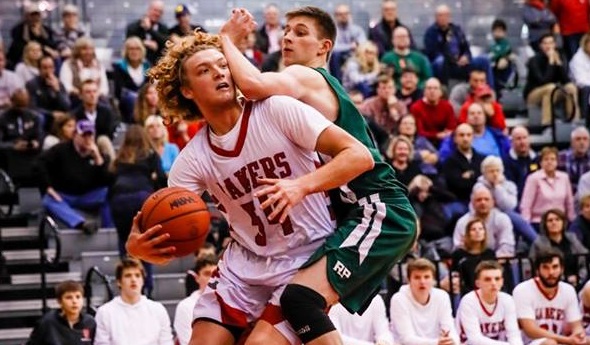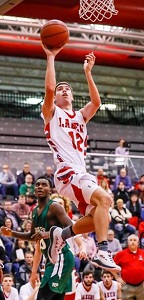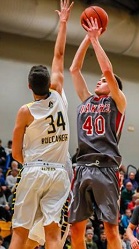
Detroit 'Longtime' Boys Coaches Down to Few
By
Tom Markowski
Special for Second Half
December 14, 2016
Gary Fralick considers himself one of the fortunate ones.
 Fralick, 66, is in his 32nd season as a head boys basketball coach. He retired from his teaching position in 2013. He started coaching at Redford Thurston in 1979, went to Royal Oak Kimball in 1984 and is in 23rd season as the head coach at Troy.
Fralick, 66, is in his 32nd season as a head boys basketball coach. He retired from his teaching position in 2013. He started coaching at Redford Thurston in 1979, went to Royal Oak Kimball in 1984 and is in 23rd season as the head coach at Troy.
Fralick might be lucky, but he is unquestionably rare. Fralick is believed to be one of three coaches in the Macomb/Oakland/Wayne area who has coached for more than 30 seasons.
There’s Dan Fife at Clarkston and Kevin Voss of Clinton Township Chippewa Valley, both of whom in their 35th seasons, all at the same school.
Another, Greg Esler at Warren DeLaSalle, is in his 30th season. He was the head coach at St. Clair Shores Lake Shore for seven seasons before going to DeLaSalle in 1994.
“We’re part of a dying breed,” Voss said.
It certainly appears so. Coaching longevity has taken on a different meaning recently. Twenty seems like a lot in these times, and in reality it is a long time. Twenty years or so ago, 20 years was normal. There’s a new normal, and 20 or 25 years isn’t it.
Many factors have contributed to this change. A person’s personal and family life often don’t coincide with the demands of coaching basketball. The responsibilities that come with coaching have increased. Some coaches say that to be an effective coach, it can be a 10- or 11-month job.
Two factors are at the forefront, and they are both financial. Coaches used to be educators as well as coaches. Yes, coaching can be viewed as teaching on the court, but at one time teaching in a classroom and coaching used to go hand in hand.
 Then there’s the subsidy coaches receive. It varies from school district to school district. Some make $4,000 a season, others can make $7,000. And it also costs money to run a program; unless the coach receives financial help from a booster club or parents, the money he or she receives begins to dwindle.
Then there’s the subsidy coaches receive. It varies from school district to school district. Some make $4,000 a season, others can make $7,000. And it also costs money to run a program; unless the coach receives financial help from a booster club or parents, the money he or she receives begins to dwindle.
But the most important factor is time.
“A tremendous amount of time is devoted to watching DVD or tapes,” Fralick said. “I know I’m dating myself with saying that. The point is, you’re watching a lot. There’s more scouting. And you don’t get paid much. Why don’t they stay as long as they used to? They get burned out. They want to spend more time with their families.
“You don’t see as many of the young coaches stay. Coaches don’t have the ambition to coach a long time. It’s not a profitable job. I don’t know what other coaches make. We used to compare what we made. Not anymore.
“Thirty years or more? I don’t see it happening. There’s the dual job thing. Things have changed. To me, it’s been a great job.”
To compensate for being away from home, Fralick brought his family with him. Sort of. He coached his son Gary, Jr., and Tim. Gary, a 1996 Troy graduate, played for his father his junior and senior seasons and Tim, a 1999 graduate, played four seasons on varsity. Fralick said he was even more fortunate to coach both on the same team (during the 1995-96 season).
Then there’s his wife, Sharon, who remains the scorekeeper.
“I’ve always had a passion for coaching and teaching,” Fralick said. “I love the game of basketball. I love the kids. There’s never a dull moment. It’s been a great ride.”
Vito Jordan has been around basketball all of his life. His father, Venias Jordan, was the boys head varsity coach at Detroit Mackenzie and Detroit Mumford before stepping down as a head coach only to return to the bench assisting his son the last six seasons.
Vito Jordan, 31, became a head coach at Detroit Osborn when he was 24. He started his coaching career the year before as an assistant to Henry Washington at Macomb College. Jordan went to Detroit Community after one season at Osborn and guided Community to its only MHSAA Finals appearance (Class B, 2013). He’s now in his fourth season as the head coach at Detroit Renaissance.
“I followed my father all of my life,” Jordan said. “I knew what I wanted to do when I was in college (Alma College). This is what I want to do the rest of my life.”
It’s different in Detroit. Schools close. Job titles change. Jordan, for instance, teaches at the Academy of Warren, a middle school in Detroit. It’s a charter school, not within the Detroit Public School system, therefore he receives his pay from two separate school systems (Renaissance is in the DPS).
There is a distinction. In some school systems coaches will receive a percentage – let’s say for argument sake, 10 percent – of their teaching salary to coach. Let’s say a person makes $60,000 a year to teach. He or she would then receive $6,000 to coach. If you coach two sports, that’s $12,000.
 Jordan is not privy to such a contract. Each job is separate. Jordan loves to coach, and he understands he must be a teacher to earn a decent living, and he’s content to continue on the path he is following. But he also knows that to make a good salary just coaching one must move on to the collegiate level like others have done.
Jordan is not privy to such a contract. Each job is separate. Jordan loves to coach, and he understands he must be a teacher to earn a decent living, and he’s content to continue on the path he is following. But he also knows that to make a good salary just coaching one must move on to the collegiate level like others have done.
“When there were coaches like my dad, Perry Watson (Detroit Southwestern), Johnny Goston (Detroit Pershing) and others, they all worked in the (Detroit Public) school system. Everyone was teaching. That was your career. None of them had aspirations of being a college coach. Not even Watson. Now everyone isn’t in the teaching profession. Maybe they do have a degree and maybe they don’t. The point is, most aren’t teachers. I can count on one hand those (in Detroit) who have their teaching certificate and coach.”
Jordan noted such successful PSL coaches like Derrick McDowell, Steve Hall and Robert Murphy who left high school to pursue a coaching career in college. Murphy guided Detroit Crockett to the Class B title in 2001 and is now the head coach at Eastern Michigan. McDowell has had two stints as a collegiate assistant coach, most recently at EMU. He’s since returned to coach at Detroit Western. Hall coached Detroit Rogers to three consecutive Class D titles (2003-05) before going to Duquesne University and Youngstown State as an assistant coach. Hall returned to Detroit last season and is in his second season as head coach at Detroit Cass Tech.
Jordan said they left high school to challenge themselves professionally, among other considerations. Voss said there are variables that influence how long a person lasts, in one school district or in coaching in general, that didn’t exist 20 years ago.
“Athletics have become pervasive in high school,” he said. “The whole booster situation you find in college is here. You can be winning but not winning enough. It’s a trickle down affect.
“Coaches complain about parents. Parents complain about playing time. High school sports is not as pure as it once was. Winning is way more important now. Now a coach comes in with a three-year window. You can have one or two down years, and the third you’d better win.
“Then there’s the pressure on your family. I’ve been lucky. My wife and I have had the players over for team dinners. We create a family atmosphere. It’s a change of society. I don’t envy the young coaches coming in.”
Community involvement has always been a priority for Voss. To keep a hand on the pulse, Voss heads the elementary basketball program within the Chippewa Valley school district. Games are held on Saturdays, and approximately 750 students take part.
“You have to have the right fit,” he said. “I’m in the right spot. You coach for different reasons when you get older. I’m enjoying the game. There’s a different level of satisfaction.”
 Tom Markowski is a columnist and directs website coverage for the State Champs! Sports Network. He previously covered primarily high school sports for the The Detroit News from 1984-2014, focusing on the Detroit area and contributing to statewide coverage of football and basketball. Contact him at [email protected] with story ideas for Oakland, Macomb and Wayne counties.
Tom Markowski is a columnist and directs website coverage for the State Champs! Sports Network. He previously covered primarily high school sports for the The Detroit News from 1984-2014, focusing on the Detroit area and contributing to statewide coverage of football and basketball. Contact him at [email protected] with story ideas for Oakland, Macomb and Wayne counties.
PHOTOS: (Top) Troy boys basketball coach Gary Fralick, left, is in his 32nd season coaching. (Middle) Detroit Renaissance boys coach Vito Jordan is following in the coaching footsteps of his father, Venias. (Below) Chippewa Valley boys coach Kevin Voss, left, is in his 35th season at his school. (Top and below photos courtesy of C&G Newspapers; middle photo courtesy of Detroit Public School League.)

Tri-Captains Pace Striving Spring Lake
February 8, 2018
By Tom Kendra
Special for Second Half
Things are looking up for the Spring Lake boys basketball team.
 The Lakers have raised the bar in recent years, making their mark on the statewide level with two appearances in the MHSAA Class B Quarterfinals over the last three seasons.
The Lakers have raised the bar in recent years, making their mark on the statewide level with two appearances in the MHSAA Class B Quarterfinals over the last three seasons.
This winter, led by a trio of tall, versatile and extremely intelligent captains in Sam Johnson (6-foot-8), Griffin Lorimer (6-4) and Jack VanWingen (6-2), Spring Lake has stepped up its schedule and its game in its quest to get back to the quarters – and perhaps further.
“When it gets to tournament time, it comes down to playing your best basketball of the year and making a run,” said Johnson, who scored a game-high 16 points on Wednesday as Spring Lake doubled up host Sparta, 50-25, for an Ottawa-Kent Conference Blue win.
“A big key in March is experience and leadership, and we definitely have plenty of that.”
Spring Lake (12-3, 6-2 in the O-K Blue), which hosts Allendale on Friday night in another conference game, showed it was going to be a force to be reckoned with early this year when it posted back-to-back tight wins over a pair of bigger schools in Rockford (48-46) and rival Grand Haven (69-66 in double overtime).
Bill Core, in his 17th year as Spring Lake’s head coach, said that in addition to good height on the front line, this may also be the smartest team he’s ever coached. Core said that intelligence helps this team make adjustments on the fly and smart decisions when the game is on the line.
 “Those three captains are all 4.0 kids, and they’re great role models,” said Core, who is assisted by Randy White. “They have high basketball IQs, and I trust them to make decisions and figure things out.”
“Those three captains are all 4.0 kids, and they’re great role models,” said Core, who is assisted by Randy White. “They have high basketball IQs, and I trust them to make decisions and figure things out.”
Johnson is the player who draws the most attention from opposing teams at 6-8, with the ability to post up and step out and knock down mid-range jump shots.
Johnson, who plans to play basketball next year at Claremont McKenna College in California, leads the Lakers with 12 points and 7.5 rebounds per game. And don’t try to hack him and send him to the free-throw line. Johnson is shooting a team-best 80 percent on free throws.
The most versatile of the three captains is Lorimer, who is hard to miss with his curly blonde hair and red shoes. He creates matchup problems with his inside-outside game, and currently averages 10 points and seven rebounds per contest.
Johnson and Lorimer are a 1-2 punch up front that most teams can’t match.
“We know one of the strengths of this team is that we’re deep in the post, and that makes it hard for teams to just focus on one guy,” explained Lorimer. “It’s good to have that balance. Plus, we’ve played together so long that we just know where the other guys are going to be.”
Lorimer’s versatility was perhaps best displayed last year at team camp in Rockford, where he was assigned to guard one of the state’s best big men in 6-9 Xavier Tillman (now at Michigan State) one day, then came back the next day and had to check standout guard Matt Beachler (now at Central Michigan).
But the most important of Spring Lake’s three captains might be VanWingen, a slasher who is the team’s best at breaking down defenses. VanWingen is adept at finding Johnson and Lorimer inside as well as kicking the ball back out to the arc to shooters Ben Arteaga, Kyle Wiersma and sophomore Cayden Ball.
“I think we’re a very well-balanced team,” said VanWingen, the top returning scorer off last year’s who is currently averaging 11.2 points, five rebounds and three assists per game. “Our big guys get a lot of attention, but we also have guards who can shoot it. It’s important that we trust each other and know that everyone is going to do their job.”
 Spring Lake’s senior trio has been too much for almost everybody to handle, with the main exception being conference rival and possible Regional opponent Grand Rapids Catholic Central, which is ranked No. 6 in Class B.
Spring Lake’s senior trio has been too much for almost everybody to handle, with the main exception being conference rival and possible Regional opponent Grand Rapids Catholic Central, which is ranked No. 6 in Class B.
The two teams met on Jan. 5 at Spring Lake in a much-anticipated showdown, but the Cougars swarmed the hosts in a lopsided 80-39 victory. The Lakers were much more competitive when the two teams played last week in Grand Rapids, but still lost, 59-40.
“We improved by 22 points the second game, and if we improve by another 22 points in the next game, we’ll win by three,” quipped Core, who knows his team will be a huge underdog if it’s fortunate enough to win the District it is hosting next month and possibly get another shot at GRCC in the Class B Regional opener at Grand Rapids West Catholic.
The Lakers can gain confidence by looking back to last year, when they lost to GR Catholic twice during the regular season, then stunned the Cougars in the Regional championship game. That win put Spring Lake in the Quarterfinals for the second time in three years, after it made a surprise run to the school’s first-ever boys basketball Quarterfinals appearance in 2015.
Lorimer believes this year’s team has the potential to make it three Quarterfinal appearances in four years.
“I really do think we have another level we haven’t reached yet,” said Lorimer, who plans to play next year at Trine University in Angola, Ind. “We may have for short stretches, but we haven’t strung it together for a whole game. That’s what we’re working on.”
 Tom Kendra worked 23 years at The Muskegon Chronicle, including five as assistant sports editor and the final six as sports editor through 2011. E-mail him at [email protected] with story ideas for Muskegon, Oceana, Mason, Lake, Oceola, Mecosta and Newaygo counties.
Tom Kendra worked 23 years at The Muskegon Chronicle, including five as assistant sports editor and the final six as sports editor through 2011. E-mail him at [email protected] with story ideas for Muskegon, Oceana, Mason, Lake, Oceola, Mecosta and Newaygo counties.
PHOTOS: (Top) Spring Lake senior Griffin Lorimer battles along the baseline in a victory earlier this season against Muskegon Reeths-Puffer. (Middle) Spring Lake senior Jack VanWingen glides in for a bucket in a victory over Muskegon Reeths-Puffer. (Below) Spring Lake senior Sam Johnson goes up for a shot during the Lakers' thrilling double-overtime win over neighboring rival Grand Haven earlier this season. (Photos by Tim Reilly.)

